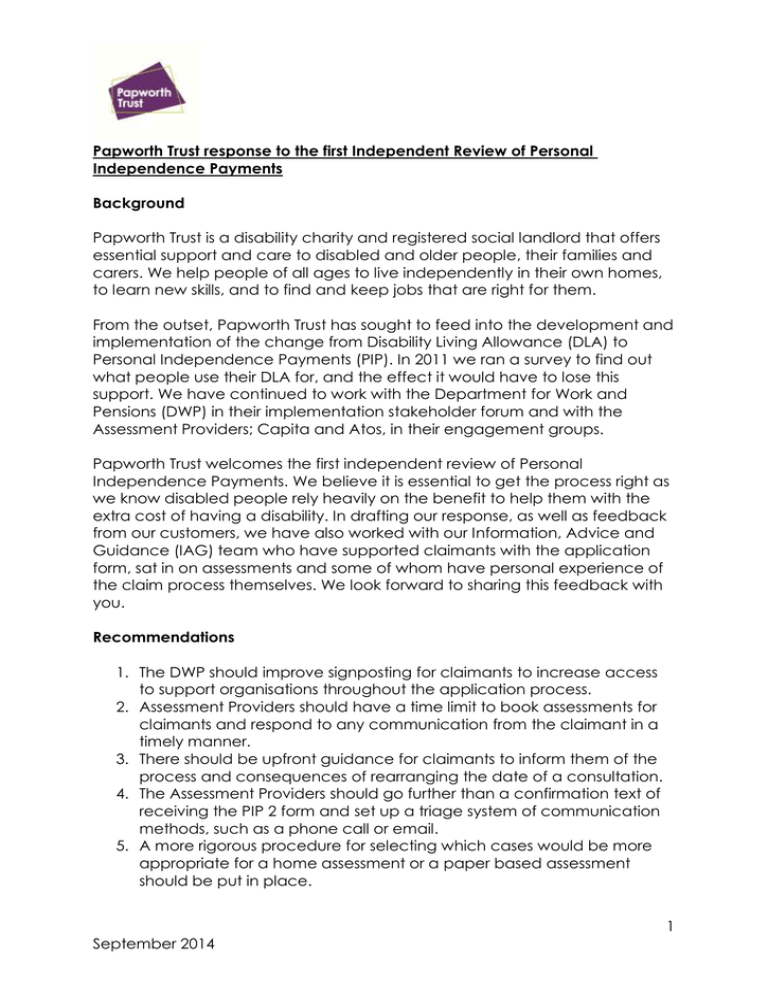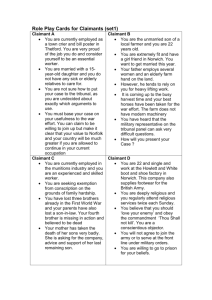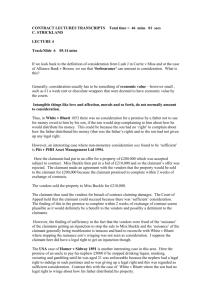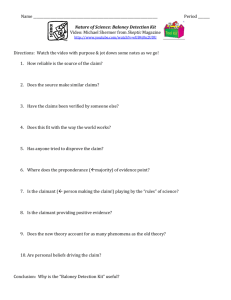Papworth Trust is a disability charity and registered social landlord... essential support and care to disabled and older people, their... Papworth Trust response to the first Independent Review of Personal
advertisement

Papworth Trust response to the first Independent Review of Personal Independence Payments Background Papworth Trust is a disability charity and registered social landlord that offers essential support and care to disabled and older people, their families and carers. We help people of all ages to live independently in their own homes, to learn new skills, and to find and keep jobs that are right for them. From the outset, Papworth Trust has sought to feed into the development and implementation of the change from Disability Living Allowance (DLA) to Personal Independence Payments (PIP). In 2011 we ran a survey to find out what people use their DLA for, and the effect it would have to lose this support. We have continued to work with the Department for Work and Pensions (DWP) in their implementation stakeholder forum and with the Assessment Providers; Capita and Atos, in their engagement groups. Papworth Trust welcomes the first independent review of Personal Independence Payments. We believe it is essential to get the process right as we know disabled people rely heavily on the benefit to help them with the extra cost of having a disability. In drafting our response, as well as feedback from our customers, we have also worked with our Information, Advice and Guidance (IAG) team who have supported claimants with the application form, sat in on assessments and some of whom have personal experience of the claim process themselves. We look forward to sharing this feedback with you. Recommendations 1. The DWP should improve signposting for claimants to increase access to support organisations throughout the application process. 2. Assessment Providers should have a time limit to book assessments for claimants and respond to any communication from the claimant in a timely manner. 3. There should be upfront guidance for claimants to inform them of the process and consequences of rearranging the date of a consultation. 4. The Assessment Providers should go further than a confirmation text of receiving the PIP 2 form and set up a triage system of communication methods, such as a phone call or email. 5. A more rigorous procedure for selecting which cases would be more appropriate for a home assessment or a paper based assessment should be put in place. 1 September 2014 6. The Assessment Providers should ensure that there is clear guidance on how many people a claimant can have to support them in an assessment and that the claimant can sit beside the assessor and see what’s on the screen during the assessment. 7. Greater emphasis should be placed on questions to reflect the fluctuation of conditions and the affect someone’s disability has on their ability to do something ‘safely, reliability and repeatedly’. 8. Claimants should have more input into what sort of further evidence is gathered and from whom. 9. The Government needs to ensure that people still on DLA continue to receive ongoing support before the transfer to PIP. Delays in the assessment process We welcome the ongoing work from both the DWP and the Assessment Providers to improve the process but feel that there is still much more to be done. In light of the difficulties of the Work Capability Assessment we feel that it is essential to get the PIP process right as soon as possible. The reported backlog and delays to cases are obvious causes for concern, though resolving these issues appear to be a priority for the DWP. Through this response, Papworth Trust would like to share other feedback we have received from our customers on how the PIP claim process could be further improved. Due to the backlog of cases, very few of our customers have received decisions on their claim. Therefore we do not feel confident in making statements regarding the overall reliability of the decisions. However, for our customers that have received final decisions, the results at the moment seem to be fairly reflective of the additional needs and support required by the individual. Claimant experience The form The feedback from our customers suggests that without the additional support of our IAG team, they would not be able to sufficiently fill out an application form. Although Papworth Trust welcomes the fact that the PIP form is shorter and less complex than the DLA form, many people are still struggling to know what information is appropriate to include. We suggest that greater emphasis is placed on signposting customers to available support. Contact with the DWP and Assessment Providers 2 September 2014 Papworth Trust has spoken to customers who have found that communication from the DWP has been a significant issue. We have heard that claimants have made the initial phone call to make the application but then have to chase the application in order to receive the PIP 2 form. For example, one claimant had to phone up to 3 times before receiving the claim pack. There have been instances where letters have arrived notifying the claimant of the date of their face to face assessment after that date has passed or only a few days prior to the appointment, when the claimant is unable to arrange appropriate support to attend. Similarly, we have also seen situations where a claimant has had to phone up and chase the providers in order to receive a date for an assessment. In order to reduce the continuing delays and reassure claimants, Papworth Trust urges the Department and the Assessment Providers to consider a shorter time limit to respond to claimant communications and become more proactive in booking consultations. Claimants also appear unaware of the implications of rearranging a consultation more than once. We therefore recommend that the DWP and Assessment Providers offer upfront guidance in terms of what happens in the event that they need to rearrange an appointment and what the implication of that might be if they need to rearrange it more than once. Papworth Trust welcomes the introduction of a text message to confirm that the PIP 2 form has been received. We believe however, that the DWP could do more to support people who do not have a mobile phone or are unable to use one. We suggest that the Department goes further and looks into a triage system of communication that could reassure claimants that are not able to use technology. If a claimant doesn’t have a mobile telephone then the confirmation could default to an email, if the claimant isn’t able to use computers then it goes to a phone call and then a letter. This would in turn free up time for the DWP who aren’t dealing with calls from people who are checking up on their application. Face to face consultation Papworth Trust has found that although the claimants have generally positive feedback about their assessors, they do not feel that the questions asked necessarily reflect the way that someone’s disability affects their daily living. In some assessments our IAG team attended, they did not believe the claimant was asked whether they would be able to participate in the activities safely, reliably, or repeatedly which is essential if the claimant is to give an accurate representation of how their condition affects them. 3 September 2014 We have heard from one customer who was extremely distressed throughout her consultation, as she was not allowed to take both her husband and a member of our IAG team in to support her. The customer had phoned in advance to ensure that having two people with her would not be a problem but at the centre was told that due to “health and safety issues” only two people were allowed inside the room. The assessment process can be incredibly stressful for people and this claimant was not allowed to take her husband in with her, and was therefore unable to receive the emotional support needed. Although this may be a rare case, Papworth Trust urges the Assessment Providers to be clearer in their policy on the number of people a claimant can take in to support them at an assessment and to have a standard procedure across all assessment centres. Need for extra support In comparison to DLA, the outcomes we are receiving from the PIP assessment process are generally positive for people with mental ill health. However, Papworth Trust still has concerns that people with mental ill health aren’t being given the option to attend a consultation at home, rather than at an assessment centre. We have supported a claimant with agoraphobia who had not been outside for several months but was asked to attend a consultation at an assessment centre. We feel that this suggests the Assessment Providers do not take into account the effect that certain conditions have on a claimant’s ability to attend an assessment centre. Due to the stress and fear of losing her benefits, the claimant attended the assessment centre but was unable to give a realistic representation of her condition due to the stress she was under. While there have been marked improvements in recognising when a claimant needs a home assessment, there is still scope for improvement. We are also concerned that people with mental ill health or learning disabilities are attending assessments without additional support when needed. Some claimants with these conditions often give answers that they believe the assessor wants to hear, and without support from a family member, friend or advocate will struggle to give a true account of how their condition affects their life on a daily basis. One customer was unable to give an appropriate representation of her condition which led to a mandatory reconsideration. When going through the reconsideration, she was supported by our IAG team and immediately awarded both higher rates. Papworth Trust believes there is not enough signposting to available support for claimants that are not IT literate or do not own a computer. We suggest that a leaflet of organisations in the local area offering support services could be sent to the claimant with the initial invitation to claim PIP. This would go further in ensuring that the claimant is able to give information in the application form and at 4 September 2014 the assessment that gives the best representation of their disability or condition, helping DWP to give them the right decision on their claim. Paper based assessments Papworth Trust has witnessed cases where a claimant has attended a face to face assessment where a paper based assessment would have been more appropriate. One such example is a profoundly disabled customer who was unable to walk, talk or feed himself, yet was called to an assessment. In order to prevent additional stress on claimants and to speed up the current time frames, we recommend that there is a more rigorous procedure for selecting which cases will be more appropriate for a paper based assessment. Openness of the process Papworth Trust’s IAG team has highlighted that they or the claimant are often unable to see what is on the computer screen during an assessment. This is despite assurances from the Assessment Providers that the assessor would sit beside the claimant in order to aid transparency and ensure accurate notes about the claimant are being taken. We recommend that the Assessment Providers communicate clearly with their assessors that this is required in order to keep the process open and to reassure claimants. Further evidence Further evidence is an essential part of the application process. We are pleased to see that the phrasing is no longer limited to ‘medical evidence’ and that the DWP will provide guidelines of what sort of evidence is helpful. However, we recommend that claimants are able to have more of an input into what sort of evidence is gathered and from whom. Claimants are often not aware of what evidence has been sought or provided when they are going through the assessment. Papworth Trust believes that ensuring the claimant is aware of what evidence is being gathered would result in more relevant evidence being returned. Assessment criteria and process Despite concerns over the level of support that people with mental health conditions receive, Papworth Trust has been pleased to see that so far people with mental ill health are generally receiving better decisions under PIP than was the case for DLA. We feel that the assessment criteria better reflect the situation of someone with mental ill health and hope to see these positive outcomes continue as more decisions are made. 5 September 2014 Transfer from DLA to PIP Papworth Trust is concerned that DLA is being reduced or stopped for people not yet in a postcode area for PIP. We have seen several examples where a DLA claimant has reapplied for DLA but has not been awarded the full amount or had it removed completely. We urge the Department to ensure that people still on DLA continue to receive ongoing support before the transfer to PIP. For further information please contact: Flora Wilkie, Parliamentary Officer, Papworth Trust E: flora.wilkie@papworthtrust.org.uk T: 01480 357200 6 September 2014





